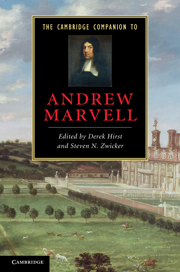Book contents
- Frontmatter
- 1 Introduction
- 2 The social modes of Marvell’s poetry
- 3 Marvell and the literary past
- 4 Borders and transitions in Marvell’s poetry
- 5 Thinking of gender
- 6 Marvell and the designs of art
- 7 Andrew Marvell’s citizenship
- 8 The green Marvell
- 9 A Cromwellian centre?
- 10 The poet’s religion
- 11 Adversarial Marvell
- 12 How to make a biography of Andrew Marvell
- Index
- Cambridge Companions to. . .
2 - The social modes of Marvell’s poetry
Published online by Cambridge University Press: 28 March 2011
- Frontmatter
- 1 Introduction
- 2 The social modes of Marvell’s poetry
- 3 Marvell and the literary past
- 4 Borders and transitions in Marvell’s poetry
- 5 Thinking of gender
- 6 Marvell and the designs of art
- 7 Andrew Marvell’s citizenship
- 8 The green Marvell
- 9 A Cromwellian centre?
- 10 The poet’s religion
- 11 Adversarial Marvell
- 12 How to make a biography of Andrew Marvell
- Index
- Cambridge Companions to. . .
Summary
Marvell once confessed that he was ‘naturally . . . inclined to keep my thoughts private’ (Letters, 166). Many readers over the years have discerned this private figure, reserved though not that austere, moving alone through the self-reflecting worlds of his lyric poetry. The Garden finds the Fall in the moment when the original self has to make room for another, rather than in any dalliance with tempting fruit: the human tragedy, it seems, lies in our not being able or permitted to live alone. No wonder, then, that Marvell ‘can seem a spokesman for solitariness’. This is the poet as Richard Lovelace’s emblematic snail, ‘within [his] own self curl’d’, and given also to the formal as well as thematic recreation of such tight self-enclosure in his verse. A private, solitary, reflective Marvell has sometimes been separated as cleanly as possible – chronologically – from the Marvell who was a prose controversialist and Member of Parliament during the last two decades of his life.
But The Garden may have been written during the earlier of those two decades, and Marvell admitted his inclination to privacy in one of the regular letters concerning public events at Westminster he sent to the civic leadership of Hull: this is a strangely open intimacy, mirroring the intimate publicness of his unprinted and not extensively circulated early political poems. Clearly, solitariness and social engagement, private and public realms and writings, are closely and often perplexingly intertwined in his work. We should perhaps not seek to simplify this by seeing him as a writer for whom ‘busy companies of men’ (The Garden, line 12) figure only as a distraction or departure from the pursuit of a good and literary life. In another letter, this time addressed to an old parliamentary friend, Sir John Trott, after the death of a son, Marvell suggests three prime sources of consolation ‘that may strengthen and assist’ Trott in his grief.
- Type
- Chapter
- Information
- The Cambridge Companion to Andrew Marvell , pp. 8 - 25Publisher: Cambridge University PressPrint publication year: 2010
- 1
- Cited by



